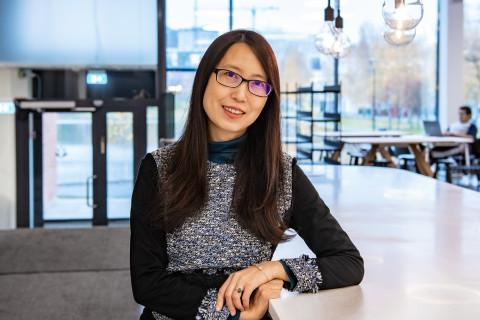Honglin Chen, a Professor in Gerontological Social Work, studies how technology could enhance the well-being of older adults and support healthy aging in place.
- Text Risto Löf | Photo Raija Törrönen
Population aging is a growing phenomenon and issue around the world. Technology, already an integral component of everyday life, holds great promise for supporting the health and independence of the aging population, says Honglin Chen, a Professor in Gerontological Social Work at the Department of Social Sciences at the University of Eastern Finland (UEF).
“Gerontechnology is the application of technology to improve the lives of older adults. It creates ever-expanding entrepreneurial opportunities to develop new products and services. There are new start-ups every day from low tech applications like a better pill box to high tech ubiquitous home health monitoring,” Chen points out.
Chen, originally from China, obtained her PhD degree from the University of Hong Kong where she started her research journey into productive aging. In later years, her research interest shifted to old age care and intervention research. Her current research interests focus upon gerontechnology and evidence-based social work practice and intervention among people with mild cognitive impairment.
“My interest in gerontological social work research stems from my field practice when I was doing my master’s in social work in Minnesota in 2004, working with a diverse group of older adults. I was curious about how the lifestyles, expectations, and availability of family caregivers varied so much from the east to the west, and how social structure and culture impact older adult life expectations. This direct exposure to the lives of older adults, as well as the knowledge that population aging will be a growing issue around the world, led to my deep interest in aging studies,” Chen says.
Connection to UEF via EU Erasmus+ project
Honglin Chen first got involved with the University of Eastern Finland back in 2017, when she was working in an EU Erasmus+ project called Building Bridges between Europe and China to Strengthen the Social Work Profession, BUIBRI.
The mission of the project was to develop social work practice and education in China, and as a result of the project, she learned about research and education in social work at the University of Eastern Finland. The project was carried out under the leadership of UEF and Fudan University.
“It has become one of the most significant international education projects in the domain of social work, supported by the EU in recent years. I was the key partner in China and during the implementation process of the BUIBRI project, I got to know a few colleagues from UEF and had a very pleasant collaboration experience. I’m also attracted by the Finnish culture. I would like to work more closely with my UEF colleagues and to discover more about how culture influences happiness in later life,” Chen says.
Colleagues within the faculty are approachable, friendly, and eager to collaborate. From the very first working day here, I sensed an amiable atmosphere that made me feel right at home.
Honglin Chen
Professor in Gerontological Social Work
Research communities studying aging and health
While UEF is not Chen’s first experience working abroad, it is undoubtedly the most distinctive one.
“The university fosters a supportive and international atmosphere, providing an inclusive environment that welcomes scholars from all walks of academia. Colleagues within the faculty are approachable, friendly, and eager to collaborate. From the very first working day here, I sensed an amiable atmosphere that made me feel right at home. Whether through impromptu visits to my office or thoughtful email exchanges, discussions about research and potential collaborations abound, reinforcing this sense of belonging.”
UEF’s 2030 strategy places significant emphasis on lifestyle, aging, and health – areas closely aligned with Chen’s research focus. Within UEF, there exists a wealth of research communities dedicated to studying aging and health. These communities form a robust interdisciplinary environment, serving as a solid foundation for collaborative efforts. By fostering interdisciplinary collaborations, UEF contributes to the advancement of scientific knowledge on a broader scale.
“I am truly enjoying my work and eagerly anticipate contributing further to the well-being of people, in collaboration with my colleagues’ endeavors.”


